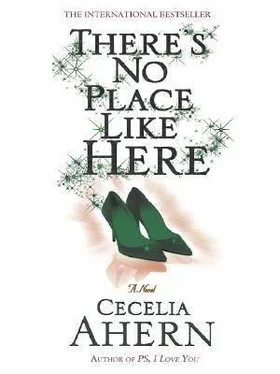She nodded.
“What do you do all day?”
“Play.”
“How tiring for you.”
She nodded. “Sometimes it is. I start school soon though.”
“There’s a school here?”
“Not in here.”
She still couldn’t get past this room. “What do your parents do all day?”
“Mama works with Granddad.”
“She’s a carpenter too?”
She shook her head. “We don’t have a car.”
“What does your dad do?”
She shrugged again. “Mama and Daddy stopped liking each other. Have you got a boyfriend?”
“No.”
“Ever had one?”
“I’ve had more than one.”
“At the same time?”
I didn’t answer.
“Why aren’t you with any of them now?”
“Because I stopped liking them.”
“All of them?”
“Almost all of them.”
“Oh. That’s not very nice.”
“No.” My mind wandered. “I suppose it’s not.”
“Does it make you sad? It makes Mama sad.”
“No, it doesn’t make me sad.” I laughed awkwardly not feeling comfortable with her gaze or loose tongue.
“You look sad.”
“How can I look sad when I’m laughing?”
She shrugged again. That’s why I hated children; there were so many empty spaces in their minds and not enough answers, the exact reason why I’d hated being one myself. There was always a lack of knowledge about what was going on and seldom did I come across an adult who could enlighten me.
“Wanda, for someone who asks a lot of questions, you don’t know a lot of answers.”
“I ask different questions than you do.” She frowned. “I know lots of answers.”
“Like what?”
“Like…” She thought hard. “The reason Mr Ngambao from next door doesn’t work in the fields is because he has a sore back.”
“Where are the fields?”
She pointed out the window. “That way. That’s where our food grows and then everyone goes to the eatery three times every day to eat it.”
“The entire village eats together?”
She nodded. “Petra’s mama works there but I don’t want to work there when I’m older, or in the fields, I want to work with Bobby,” she said dreamily. “My friend Lacey’s dad works in the library.”
I searched for the importance of her sentence and found none. “Does anybody ever think of spending their time more wisely, like trying to get the hell out of here?” I asked smartly, more to myself.
“People try to leave,” she said, “but they can’t. There’s no way out, but I like it here, so I don’t mind.” She yawned. “I’m tired. I’m going to bed. ’Night.” She climbed down off the couch and made her way to the door dragging a torn blanket behind her. “Is this yours?” She stopped, bending over to pick up something from the floor. She held it up and I saw it shine as the light seeping in from under the door hit it.
“Yes,” I said, taking my watch from her hands.
The door opened, orange light filled the room, forcing me to close my eyes, and then I heard it shut again and I was alone in the darkness with the words of a five-year-old ringing in my ears.
“People try to leave but they can’t. There’s no way out…”
That was the other thing I hated about kids; they always said the exact things that deep down you already knew, would never admit to, and most certainly never wanted to hear.
“So Joseph is a carpenter. What is it that you do, Mary?” I asked Helena as we strolled along the dusty path of the village.
Helena smiled.
We had walked through the village and now wandered beyond, passing fields of glorious golds and greens, dotted with people of all nationalities who stooped and rose as they worked the farm, growing anything and everything I had ever and never heard of. Dozens of greenhouses speckled the landscape, the villagers taking every opportunity to grow what they could. Like the diverse people, the weather had arrived in this place in all its fiery yet vital forms. Already in just a few days I’d experienced the sweltering heat, a thunderstorm, a spring breeze, and a winter chill, inconsistent weather I presumed to be the explanation for the unusual array of plants, trees, flowers, and crops that all managed to live together successfully in the same environment. The explanation for the humans, I hadn’t yet learned of. But it seemed there were no rules regarding nature in this place. Four seasons in one day was accepted, welcomed, and adapted to. It was warm again now as we strolled side by side, me feeling revitalized after sleeping more hours in one night than I had since I was a child. Since Jenny-May.
“Since Jenny-May what ?” Gregory would always ask me. “Since she went missing?”
“No, just since Jenny-May-period,” I would reply.
That morning I encountered someone I had been searching for for twelve years. Helena had urged me onward, snapping shut my gaping mouth and clicking fingers before my goggling eyes. I was overwhelmed by her presence, and I was never overwhelmed. I was dumbfounded, and I was never dumbfounded. I suddenly felt lonely, and I was never lonely. But lately I was a lot of things I never used to be. After so many years of looking, it was near impossible to remain as serene as Helena when the faces I saw in my dreams passed me in my waking hours.
“Stay calm,” Helena had murmured more than once into my ear.
Robin Geraghty was the first of my ghosts to float by. We had been seated at the eatery, a stunning timber building on two levels, with a balcony around four sides from which the views of forestry, mountains, and fields were displayed to perfection. It wasn’t a crammed work cafeteria, as I had imagined; it was a beautiful building that housed the local villagers for breakfast, lunch, and dinner; a scheme created to help ration the food they collected and grew. Money, I recalled, had no value here, not even when wallets filled with it arrived on their doorsteps. “Why spend money on something that arrives in abundance daily?” Helena had asked by way of explanation.
On the front of the building, ornate handcrafted timber decorated the entrance as it did the registry. Owing to the many languages of the village, Helena explained, these carvings were the most productive and attractive methods of exhibiting the use of the building. Oversized grapevines, wine bottles, and bread loaves decorated the front, looking so delectable even in their lumber form that I had to run my hand along the smooth curve of the berry.
I was returning from my trip to the buffet-style counter when I saw Robin, causing me almost to drop my tray of doughnuts and iced coffee. (It appeared that a box of food had gone missing from a Krispy Kreme delivery van and had arrived on the outskirts of the village that morning, much to my delight. I had visions of a delivery man, clipboard in hand, ignoring the insults of a stressed-out store manager, as he scratched his head in wonder and recounted the contents of his van, parked up on a busy loading bay outside a downtown New York store while I, and a line of hungry people behind me, dove into the basket in a long-lost place.) The appearance of Robin almost caused me to douse myself; it was as though my iced coffee got a fright too, wavering slightly in its stance.
Robin Geraghty had disappeared at the age of six. She had gone out to play in her front garden in the suburbs of North Dublin at eleven A.M. but was gone when her mother checked on her at eleven-oh-five. Everyone, and I mean everyone , the family, the country, the Gardaí, which at that time included me, all thought she had been abducted by the next-door neighbor. Fifty-five-year-old Dennis Fairman, an odd man, a loner, spoke to nobody but Robin each time he passed her, much to her parents’ concern.
Читать дальше












